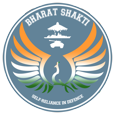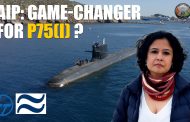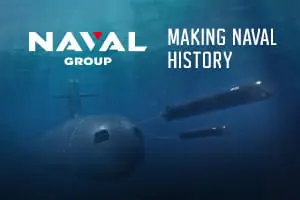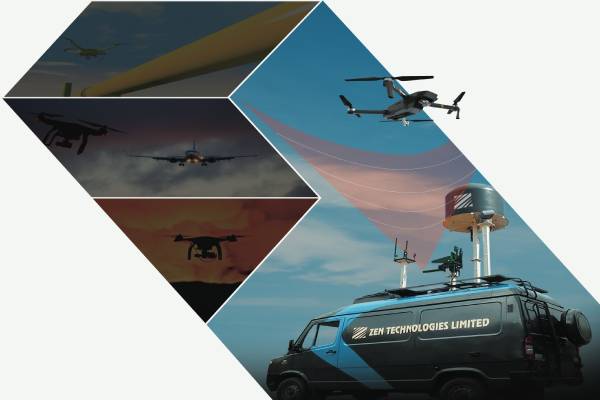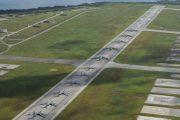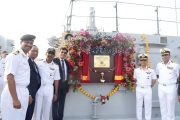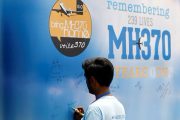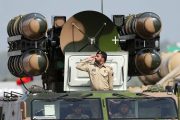Nitin A Gokhale, Founder & Editor-in-Chief, BharatShakti.in (NG): I’m at Aeron Systems, a 10-year-old company which manufactures, designs and develops inertial navigation systems. They have been working with DRDO and some of the Defence Public Sector units. They’ve been into programs like the Armoured vehicles, also with some of the programs with the Naval systems such as the Samudrika. However, they are now looking to step up into airborne systems as well as some Armoured vehicle programs (he has already mentioned this in the earlier sentence) that are going to come up and they are working with ARD which is one the arms of DRDO.
With me are Ashwini Shukla and Abhijeet Bokil, the two driving forces behind the company. So let’s ask them what exactly they are looking at and what they have developed. I believe they have developed something new – the lightweight Inertial Navigation System. Can you tell us what it is exactly?
Abhijeet Bokil, MD & CTO (AB): We have developed a micro miniature Inertial Navigation System. It’s a full-fledged INS equipped with a multi constellation GPS and it weighs just 35 grams and its dimensions are 35mm x 35mm x 18mm and we want to pitch it for soldiers (grammar). So all the Smart Soldier Navigation and Battlefield management system programs, we are pitching it for them. It is going to give indoor and outdoor navigation capability to soldiers. It’s state of the art and one of a kind. It’s the world’s smallest tactical grade INS that we have developed.
NG: Has it been accepted? Some of your systems haven’t / have been accepted. Can you show us which of them are here with you?
AB: Yes. So this is the Octantis unit which has gone through all Mill qualifications, Mil 461E, EMIMC, 810G, Vibration shock qualification and we are trying to get it qualified for airborne applications also. So it has gone through all the certifications that are required to be used in any of the military programs that are there.
NG: So Ashvani, you said you are a 10-year-old company. Tell us how has the journey been so far and what are you looking forward to?
Ashvani Shukla, CEO (AS): So far the journey has been very exciting I would say. This is a core technology area that we are working in and we have developed all the hardware, software and infrastructure on our own. And the product that we are making is strategically very important. So as a country, if you see 95% of our INS needs are still fulfilled by foreign OEM’s, so there is a big requirement. And since it is a niche technology, it takes time for people to believe that we can make this in India and that we have been doing it. We have been going to DRDO’s and DPSU’s and convincing them that we have made this in India and that it works, so we’ve done a lot of POC’s. And thankfully these systems are not deployed with the Armoured vehicles through DRDO’s and through DPSU’s. One of our products is now getting semily? qualified and is going to go on Tejas, our very own indigenous fighter aircraft and that’s going to be a major milestone for us. Plus the products that Abhijeet explained, it’s world’s smallest tactical class Inertial Navigation System that we have made and it has huge numbers of applications in Soldier navigation that we are looking at. Plus, we are talking about precision weapons, where you need very small micro size INS systems. So these are the kind of things that we are doing. We are also looking at using this for driverless cars and driverless vehicles, which is a new and a big market that is coming up and it fundamentally requires an INS piece. So here since what you need is an automotive kind of application, a product that performs really well and yet is priced low, we as an Indian company are able to do that because we are developing it at an Indian cost, so we are able to break down the price. And of course Indian brains are really good, so we are able to bring the world’s best performances. So we are very confident that the product that we’re developing here, they will reach out to the world and they will be looking at India as a country from where core technologies can come up very well.
NG: That’s excellent. So if you look at the roadmap for the future, if I have to ask you ‘how do you see yourself say two or three years down the line’, what would you say?
AS: There are some programs that we are going to supply in the next two to three years. One is the ……… aircraft. Second is the precision weapons that we want to supply the INS to. The third is that we have started supplying for automotive applications, so our systems have already started going in (instead – been installed in) heavy vehicles and are being used as safety devices. Plus, we are working with automotive companies for autonomous vehicles, pilotless vehicles. So in the next two to three years we want our systems to be airborne and be a part of aircrafts, they should go into the precision weapons and then third we are looking at Automotives. So in the driverless cars that are coming up, we want our systems to be used there.
NG: How encouraging has the Government, or the system itself, been? Are they now encouraging startups like yourself or smaller companies like yourself? Are you finding a change in their attitude and approach?
AS: Well, I would say that a lot of good changes are happening. One, at policy level there are good policies that are coming up that are favouring companies like us, i.e. core technology companies. However, there is always a gap between the intention, which is getting reflected in the policies, versus the execution. So the ground reality is still a little challenging and we are seeing that the fact that it’s a niche technology, a Defence technology, is strategic nature, it takes time for mindsets to change. But we are hopeful that the way things are moving forward, the way in which the Government is coming up with the new policies, like make to? policies where the Government is funding 90% of the development cost and we are in fact pitching for one of the programs where indigenous INS is to be built. So we are very hopeful with the Government policies and we are now also seeing good support from the scientists. In fact, we would say we are very lucky to have such good scientists at RND Engineers and ARD who are close by and that actually gave us the initial breakthrough. They were the ones who saw the product, tried it out and now have faith in us. So now whenever they have a requirement, they call us and ask us to come over. So things take time to change, but I would say that it is going in a positive direction.
NG: So you’re very positive about what’s going to happen?
AS: Yes, we are very positive.
NG: Abhijeet, are you positive about it as well?
AB: Yeah I am very positive about it and I really hope that our own mindset to accept these products, I mean to accept Indian products should change. That is the only barrier we have I would say. As soon as that changes there is nothing stopping us.
NG: That’s great to know and we can only wish you all the best in your endeavours.
AS & AB: Thank you.
NG: So that is Aeron Systems for you and the people who are behind developing an Indigenous INS for various applications in Defence. This is Nitin Gokhale signing off for BharatShakti.in.

